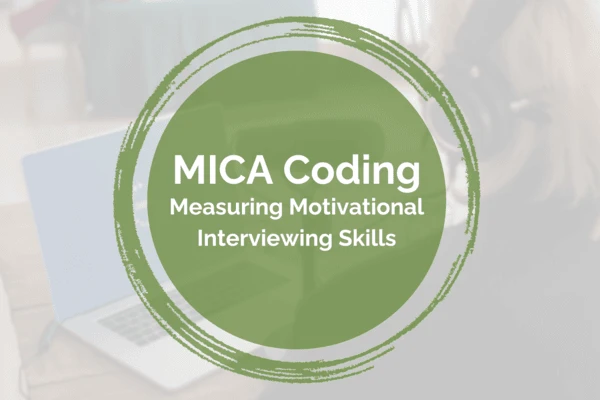Ready to evaluate motivational conversations? Provide feedback to others for skill enhancement? Elevate your self-reflection for improved skill? Let’s power up together!
Professionals in healthcare, counseling, and social work face challenges in demonstrating and improving their skills in Motivational Interviewing (MI) without tangible ways to assess their skills and techniques. Various types of MI rating instruments such as the MICA (Motivational Interviewing Competency Assessment), MITI (Motivational Interviewing Treatment Integrity), and MISC (Motivational Interviewing Skills Code) help quantify soft skills like empathy, reflective listening, and client-centered care. Specific measuring and feedback is critical for enhancing professional growth and ensuring high-quality, client-centered care.
Why rating MI skills is important
Often, practitioners complete a foundational course where they learn about MI and assume they are proficient in using MI. Yet–as with any complex skill–true mastery takes much time, practice, and feedback. Building fidelity with MI requires ongoing, consistent effort based on coaching feedback and self-reflection. When we put this extra effort forward, we can better ensure our consistent, high-quality practice. This is where MI coding and coaching becomes essential:
- Keeps Skills Sharp: Regular coding feedback helps MI practitioners maintain and improve their skills by assessing their performance and identifying key areas to work on.
- Provides Helpful Feedback: Coding sessions give structured feedback, helping practitioners see their strengths and set clear goals for improvement and professional growth.
- Improves Client Outcomes: Better MI skills mean more effective, client-centered care, which leads to positive results for clients–and reduced stress on the provider!
- Builds Confidence: Receiving MI coding feedback regularly boosts confidence and helps practitioners feel more skilled and capable in their work.
Types of Motivational Interviewing Codings
The MISC system is a foundational tool for evaluating MI sessions through detailed analysis of practitioner behaviors, offering comprehensive insights but requiring extensive training and multiple review opportunities to rate a work sample accurately. Coders required extensive training, and the depth of detail to be rated–while thorough–proved overwhelming for practical implementation in busy professional settings. The MISC’s complexity and time-consuming nature highlighted the need for more practical tools.
The MITI series responded to this need for a more approachable and usable method. It introduced a simpler, behavior-based approach that emphasized key MI elements, making it easier to train and monitor raters as well as provide more streamlined feedback. The MITI does utilize language and concepts that some learners do not immediately understand, so some time in deciphering results is needed.
The MICA coding system is built on all the positives that preceded it, from lessons taught by the MISC and MITI. In the MICA, practical, easy-to-apply and understandable skill dimensions are prioritized. The MICA requires less time to learn to use well and helps practitioners get better at MI faster. Overall, the MICA created a comprehensive and user-friendly tool for assessing MI competency and providing feedback to enhance practitioner skills. The MICA also delivers a total or aggregate MI score, which is helpful for a single glance at whether the learner met competence criteria.
Overview of MICA coding
The MICA allows users to evaluate a practitioner’s helping conversation, assess MI competence from a quality assurance perspective, and move from a beginner level to a proficient demonstration. Unlike other tools, it benefits MICA coders to have prior Motivational Interviewing training. The MICA is designed to work together with mentoring based on the coder’s skillfulness and experience with MI, aiming to deliver clear, structured feedback to help other learners improve their MI practice.
For more information about MICA approach download the free MICA Manual from the MICA website.
While MICA manual is available online for free, to become a MICA coder it is important to be competent in Motivational Interviewing and to get adequate training with a MICA co-developer or their designate.
Ali Hall x CCMI MICA Course
CCMI has partnered with Ali Hall, one of the MICA co-developers to offer a new, comprehensive MICA coding course. Ali is a seasoned trainer, MI expert and a member of the Motivational Interviewing Network of Trainers (MINT) and a MINT Certified Trainer. With over 4000 MI workshops facilitated for various professionals and trainers, including criminal justice, behavioral health, and healthcare providers, she also specializes in MI coding training, coaching, and consulting for sustainable MI practice.
This 12-hour Complete Foundation webinar series will introduce participants to the MICA’s two strategies and five intentions, plus provide multiple opportunities to rate motivational conversations using the MICA. After completing the course you will receive 12 follow-up skill enhancement emails — one weekly after course completion to support practice integration. From this thorough foundation, you will be able to decide for yourself, your organization, and/or your system of care whether and how to implement the MICA into your essential evaluation and skill development processes.
This training will be held virtually, as a series of 4 webinars:
- April 7, 2025 from 8:30-11:30 am PST
- April 8, 2025 from 8:30-11:30 am PST
- April 14, 2025 from 8:30-11:30 am PST
- April 15, 2025 from 8:30-11:30 am PST
This course is ideal for healthcare professionals (e.g., counselors, social workers, psychologists) using Motivational Interviewing in their practice and aiming to refine their skills and offer better client outcomes, as well as supervisors and trainers looking to build capacity within their teams.
Consider integrating MICA into your practice for ongoing professional development and improved client outcomes and explore CCMI’s MICA course to fast-track their learning.
Check out the course page or connect with us at admins@centrecmi.ca for more details.

